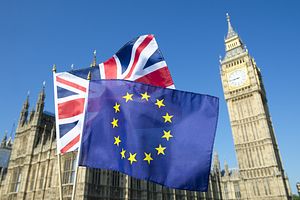As world markets endure uncertainty after Brexit, analysts are predicting that the UK’s vote to leave the EU will have a relatively small impact on Pakistan’s economy. Even Pakistan’s minister of commerce has reassured the country that Brexit will not affect Pakistan’s exports to the European Union. Thus, there should not be much concern — after all, Pakistan is comparatively insulated from global markets and its exports constitute only 7 percent its GDP.
Yet in the immediate aftermath of the UK’s decision to leave the EU, Pakistan’s stock markets fell by over 1400 points, spurred by panic in the country’s auto and textile sectors, magnified by an unnerved Ministry of Commerce. How much of an impact will the UK’s vote to leave the EU really have on the Pakistani economy?
The EU is the most important trading bloc for Pakistan, accounting for 21.2 percent of Pakistan’s total exports. Pakistan was awarded the Generalized System of Preferences Plus (GSP), a preferential tariff system status, by the EU in 2013. As a result of the GSP Plus, Pakistan’s exports to the EU increased from $6.21 billion (2013) to $7.54 billion (2014).
Exports subsequently fell to $6.67 billion (July-December 2015). Despite this, the trade agreement has important implications for Pakistan’s exports. Exporters are now worried if Pakistan will receive the same benefits after the UK’s vote to exit the EU. Though the Pakistani minister of commerce has reaffirmed that Brexit will not immediately affect Pakistan’s exports under the GSP, the ministry nevertheless fears that Islamabad may lose a supporting voice in Brussels for the continuation of the GSP preferential package.
Pakistani exports to the EU are dominated by textiles, clothing, and leather products. Textiles and clothing account for almost 75 percent of experts to the EU, and leather accounts for an additional 10 percent. Therefore, the health of the European economy as well as the monetary value of the euro and pound sterling are of crucial importance to Pakistani exporters. A depreciated euro and sterling makes Pakistani exports less attractive, leading to a decline in demand. Moreover, the decline in consumer confidence in the UK will likely lead to a decline in Pakistan’s exports in the near future.
The UK additionally is the source of almost 20 percent of total remittances into Pakistan, while the rest of EU accounts for 3 percent of total worker remittances. A weaker pound means bad news for migrants working abroad as well as their families living at home.
Furthermore, in recent years, the UK has become one of Pakistan’s leading bilateral donors and has consistently supported Pakistan’s social and economic sectors. Now, with the uncertain fate of Britain’s economy, the fear is that such grants would take a hit. Apart from the value of the pound, aid has an important qualitative value and a decrease will not be a good sign for Pakistan.
While the pound and euro depreciated because of Brexit, safe havens like the Japanese yen and gold became more attractive. The rise in the yen could have an adverse impact on the Pakistani automotive sector as it a frequent importer of automotive parts from Japan.
Though the impact of Brexit on Pakistan’s economy is relatively muted so far and is unlikely to change the direction of nation’s economy more broadly, it is important to realize that Pakistan is not immune from the effects entirely either. There are concerns over trade negotiations as to what compromise the UK will be able to extract from the EU as it leaves and what this will mean for the future of UK-Pakistan trade relations.
So far, both countries enjoy favorable bilateral relations and there is a good chance that Pakistan will be able to extract a promising trade agreement with a post-EU UK. However, during this transition period, both Pakistan’s businesses as well as the government will face challenges as the picture of UK and the EU remains blurry.
Usman Javed is reading MPhil Technology Policy at the Judge Business School, University of Cambridge.

































